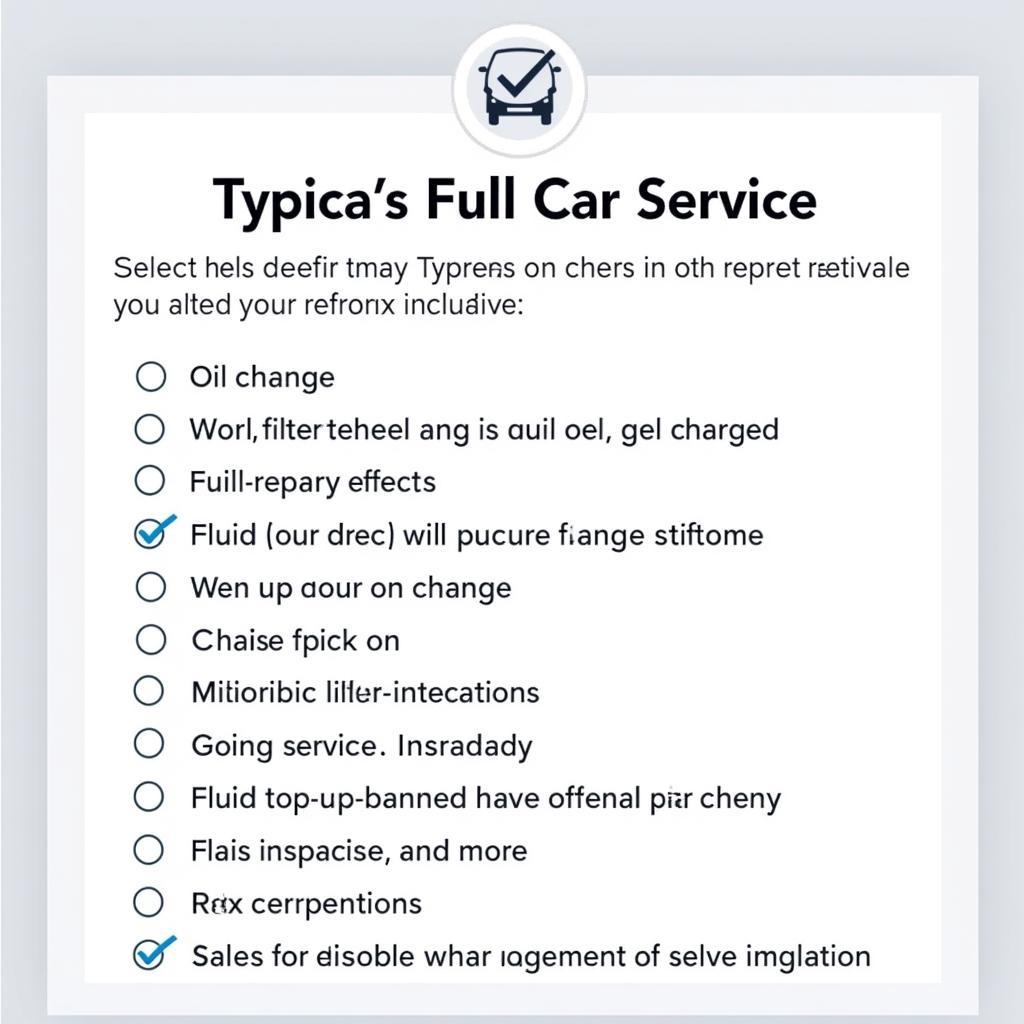Is a Full Car Service Worth It?
For many car owners, the thought of a full car service conjures up images of hefty bills and potentially unnecessary work. So, is a full car service truly worth the investment, or are you better off sticking to basic oil changes? This comprehensive guide will delve deep into the value proposition of a full car service, exploring its components, benefits, and potential drawbacks to help you make an informed decision.
Understanding the Full Car Service
Before diving into the “worth it” debate, let’s establish what a full car service entails. Unlike a basic service, which typically focuses on oil and filter changes, a full car service is much more comprehensive. It’s designed to inspect, maintain, and address potential issues across various systems in your vehicle.
 Mechanic inspecting a car's engine during a full service
Mechanic inspecting a car's engine during a full service
While the specifics can vary depending on the service provider and your car’s make and model, a full car service generally includes:
- Oil and Filter Change: The cornerstone of any car maintenance, this involves replacing used oil and the filter to ensure smooth engine operation.
- Fluid Top-Ups: This includes checking and topping up essential fluids like coolant, brake fluid, power steering fluid, and windshield washer fluid.
- Brake Inspection: A vital safety check, this involves inspecting brake pads, discs, and lines for wear and tear.
- Tire Condition and Pressure: Ensuring your tires are properly inflated and have sufficient tread is crucial for safe handling and fuel efficiency.
- Battery Check: The battery’s voltage and charge are assessed to prevent unexpected starting problems.
- Lights and Electrical System: All exterior and interior lights are checked, and the electrical system is inspected for faults.
- Engine Inspection: The mechanic will inspect the engine for leaks, belt wear, and other potential issues.
- Air Filter Replacement: A clogged air filter can reduce engine performance and fuel economy, making replacement essential.
- Cabin Air Filter Replacement: This often-overlooked filter ensures the air quality inside your car is clean and free from pollutants.
The Case for a Full Car Service: Weighing the Benefits
Now, let’s explore why investing in a full car service can be a wise decision for car owners:
1. Proactive Maintenance, Not Reactive Repairs:
A full car service focuses on prevention rather than reaction. By identifying and addressing minor issues before they escalate into major problems, you can save significant money on costly repairs down the line.
2. Enhanced Safety and Reliability:
Regular, comprehensive checks of your car’s vital systems, such as brakes, tires, and lights, ensure your vehicle remains safe and reliable on the road. This peace of mind is invaluable, especially if you frequently drive long distances or in challenging conditions.
3. Improved Fuel Efficiency:
Well-maintained engines, properly inflated tires, and clean air filters contribute to optimal fuel combustion, leading to better fuel efficiency and lower running costs.
4. Extended Vehicle Lifespan:
Just like any other machine, regular care and attention can significantly extend the lifespan of your vehicle. By addressing minor issues promptly, you prevent them from snowballing into major problems that could potentially shorten your car’s life.
5. Higher Resale Value:
A well-maintained car with a complete service history is more appealing to potential buyers, commanding a higher resale value. A full car service record demonstrates that you’ve taken good care of your vehicle, increasing its desirability in the used car market.
Addressing Potential Concerns: When a Full Service Might Not Be Necessary
While the benefits of a full car service are compelling, there are situations where it might not be strictly necessary:
- Brand New Cars: New cars come with comprehensive warranties and scheduled maintenance plans, often covering full services for the initial years of ownership.
- Low Mileage and Recent Service: If you’ve recently had a full service and your car has been driven minimally since then, a basic service might suffice until your next scheduled maintenance.
- Financial Constraints: If you’re on a tight budget, a full car service can seem like a significant expense. However, it’s important to remember that neglecting regular maintenance can lead to much larger costs in the future.
Making the Right Call for Your Car
Ultimately, the decision of whether a full car service is worth it depends on your individual circumstances and driving habits. Factors to consider include:
- Age and Mileage of Your Car: Older cars with higher mileage generally benefit more from the comprehensive checks included in a full service.
- Driving Conditions: If you frequently drive in harsh conditions, such as extreme temperatures, rough terrain, or heavy traffic, a full service can help mitigate wear and tear.
- Your Budget: While a full car service is an investment, it’s often more cost-effective than dealing with major repairs caused by neglected maintenance.
Finding a Reputable Mechanic: A Crucial Step
Choosing the right mechanic to perform your full car service is as important as the service itself. Look for a reputable garage with experienced technicians and transparent pricing. Don’t hesitate to ask for recommendations from friends, family, or online reviews.
Conclusion: Investing in Your Automotive Peace of Mind
A full car service is not just about ticking boxes on a checklist; it’s an investment in your car’s longevity, reliability, and your peace of mind. By proactively addressing potential issues and keeping all systems in top shape, you ensure a smoother, safer, and potentially more economical driving experience in the long run. While a full service might not be necessary for every car in every situation, understanding its value and weighing the factors discussed above can help you make an informed decision that aligns with your needs and budget.
Don’t wait for warning lights to flash or strange noises to surface. Take control of your car’s health and consider a full car service – your vehicle will thank you.
FAQs:
1. How often should I get a full car service?
Most manufacturers recommend a full car service every 12,000 miles or 12 months, whichever comes first. However, referring to your car’s owner’s manual for specific recommendations is always best.
2. Can I perform a full car service myself?
While some basic maintenance tasks can be done at home, a full car service requires specialized tools, knowledge, and experience. It’s best left to qualified mechanics to ensure all checks and repairs are done correctly.
3. What’s the average cost of a full car service?
The cost can vary significantly depending on your car’s make and model, location, and the service provider. On average, you can expect to pay between $200 and $400 for a full car service.
4. What if my car needs repairs beyond the full service?
Reputable mechanics will always contact you before performing any additional work beyond the agreed-upon service. They’ll explain the issue, provide a cost estimate, and obtain your authorization before proceeding with repairs.
5. Is it worth getting a full car service before selling my car?
While not mandatory, a recent full car service can increase your car’s resale value and make it more attractive to potential buyers. It demonstrates that the vehicle has been well-maintained and is less likely to experience mechanical issues in the near future.
Still have questions about car servicing?
Check out our other helpful resources:
- What’s in a car service?
- A car service definition
- How much does it cost to service a car nz
- How to service the car
- How much to tip lawn care service
Get in touch with our team of experts for personalized advice and assistance:
WhatsApp: +1(641)206-8880
Email: [email protected]
We’re available 24/7 to answer your questions and help you keep your car running smoothly.

